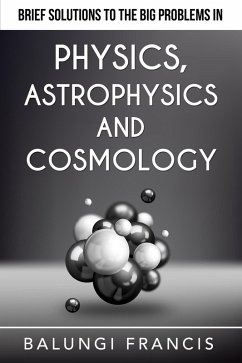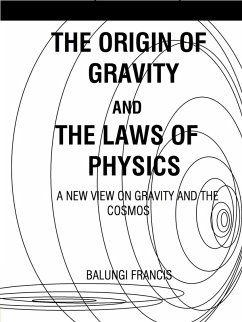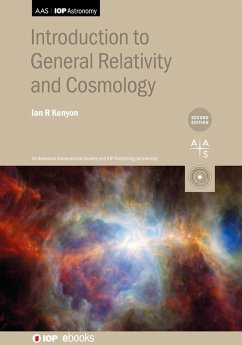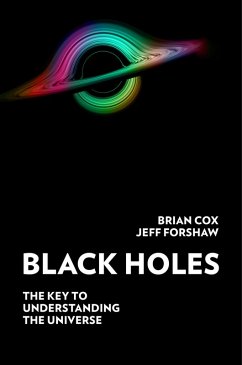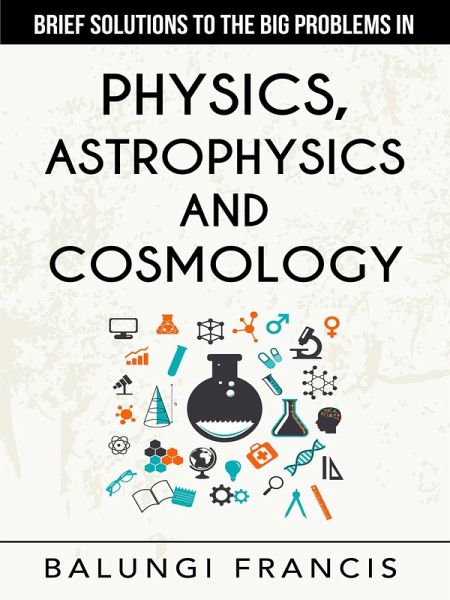
Brief Solutions to the Big Problems in Physics, Astrophysics and Cosmology second edition (eBook, ePUB)

PAYBACK Punkte
0 °P sammeln!
In 1900, the British physicist Lord Kelvin declared "There is nothing new to discover in physics. All that remains is to more accurately measure its quantities" today, hardly anyone would dare say that our knowledge of the universe and everything in it is almost complete.There are still some deficiencies in the standard model of physics, such as the origin of mass, the strong CP problem, neutrino oscillations, matter-antimatter asymmetry and the nature of dark matter and dark energy. Another problem lies within the mathematical framework of the standard model itself.Some of the major problems ...
In 1900, the British physicist Lord Kelvin declared "There is nothing new to discover in physics. All that remains is to more accurately measure its quantities" today, hardly anyone would dare say that our knowledge of the universe and everything in it is almost complete.
There are still some deficiencies in the standard model of physics, such as the origin of mass, the strong CP problem, neutrino oscillations, matter-antimatter asymmetry and the nature of dark matter and dark energy. Another problem lies within the mathematical framework of the standard model itself.
Some of the major problems in physics are theoretical, meaning that existing theories seem incapable of explaining a certain observed phenomena or experimental result. The others are experimental meaning that there is difficulty in creating an experiment to test a proposed theory.
In what follows, there is given a discussion of what are arguably the most unsolved problems in physics, astrophysics and cosmology. And this book sets to solve them living none untouched. The form of the discussion is not negative: formulating a problem succinctly is essential to a solution. Perhaps the most remarkable aspect of what follows is that many of the problems are interrelated, so the solution of one or a few opens the prospect of widespread advancement.
An excerpt from Lee Smolin's book "the trouble with physics" explains in detail what this book is all about as given below in Lee's original words.
To be fair we've made two experimental discoveries in the past few decades, that neutrinos have mass and that the universe is dominated by a mysterious dark energy that seems to be accelerating its expansion. But we have no idea why neutrinos (or any other particles) have mass or what explains their mass values. As for dark energy, its not explained in terms of any existing theory. Its discovery cannot then be counted as a success, for it suggests that there is some major fact we are all missing. And except for dark energy, no new particle has been discovered, no new force found, no new phenomenon encountered that was not known and understood twenty-five years ago.
Don't get me wrong. For the past 25years we have certainly been very busy. There has been enormous progress in applying established theories to diverse subjects; the properties of materials, the molecular physics underlying biology, the dynamics of vast clusters of stars. But when it comes to extending our knowledge of the laws of nature we have made no real head way. Many beautiful ideas have been explored, and there have been remarkable particle aaccelerator experiments and cosmological observations, but these have mainly served to confirm exisiting theory. There have been few leaps forward, and none as definitive or important as those of the previous 200years. When something like this happens in sports or business, it's called hitting the wall.
What are the major unsolved problems in physics? And what can we do to solve them? These are the central questions of my book
There are still some deficiencies in the standard model of physics, such as the origin of mass, the strong CP problem, neutrino oscillations, matter-antimatter asymmetry and the nature of dark matter and dark energy. Another problem lies within the mathematical framework of the standard model itself.
Some of the major problems in physics are theoretical, meaning that existing theories seem incapable of explaining a certain observed phenomena or experimental result. The others are experimental meaning that there is difficulty in creating an experiment to test a proposed theory.
In what follows, there is given a discussion of what are arguably the most unsolved problems in physics, astrophysics and cosmology. And this book sets to solve them living none untouched. The form of the discussion is not negative: formulating a problem succinctly is essential to a solution. Perhaps the most remarkable aspect of what follows is that many of the problems are interrelated, so the solution of one or a few opens the prospect of widespread advancement.
An excerpt from Lee Smolin's book "the trouble with physics" explains in detail what this book is all about as given below in Lee's original words.
To be fair we've made two experimental discoveries in the past few decades, that neutrinos have mass and that the universe is dominated by a mysterious dark energy that seems to be accelerating its expansion. But we have no idea why neutrinos (or any other particles) have mass or what explains their mass values. As for dark energy, its not explained in terms of any existing theory. Its discovery cannot then be counted as a success, for it suggests that there is some major fact we are all missing. And except for dark energy, no new particle has been discovered, no new force found, no new phenomenon encountered that was not known and understood twenty-five years ago.
Don't get me wrong. For the past 25years we have certainly been very busy. There has been enormous progress in applying established theories to diverse subjects; the properties of materials, the molecular physics underlying biology, the dynamics of vast clusters of stars. But when it comes to extending our knowledge of the laws of nature we have made no real head way. Many beautiful ideas have been explored, and there have been remarkable particle aaccelerator experiments and cosmological observations, but these have mainly served to confirm exisiting theory. There have been few leaps forward, and none as definitive or important as those of the previous 200years. When something like this happens in sports or business, it's called hitting the wall.
What are the major unsolved problems in physics? And what can we do to solve them? These are the central questions of my book
Dieser Download kann aus rechtlichen Gründen nur mit Rechnungsadresse in A, B, CY, CZ, D, DK, EW, E, FIN, F, GR, H, IRL, I, LT, L, LR, M, NL, PL, P, R, S, SLO, SK ausgeliefert werden.




